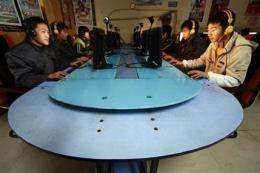China rejects claims of Internet hacking attacks

(AP) -- The Chinese government denied involvement in Internet attacks and defended its online censorship Monday after the United States urged Beijing to investigate complaints of cyber intrusions in a dispute that has added tension to bilateral relations.
China's policy against Internet hacking attacks is transparent and consistent, the Ministry of Industry and Information Technology said, nearly two weeks after search giant Google Inc. threatened to pull out of the country after finding that the e-mails of activists had been pried into.
"Any accusation that the Chinese government participated in cyber attacks, either in an explicit or indirect way, is groundless and aims to discredit China," an unidentified ministry spokesman said.
"We are firmly opposed to that," the spokesman said, according to a transcript of an interview with the official Xinhua News Agency posted on the ministry's Web site Monday.
The State Council, China's Cabinet, defended the country's regulation of the Internet, saying it is legal and that other parties should not interfere in Beijing's domestic affairs, Xinhua reported.
The remarks follow a Jan. 12 threat from Google to pull out of China unless the government relented on censorship. The ultimatum came after Google said it had uncovered a computer attack that tried to plunder its software coding and the e-mail accounts of human rights activists protesting Chinese policies.
Google traced the attacks on its computers to hackers in China, but hasn't directly tied them to the Chinese government or its agents.
A Chinese Internet security official questioned Google's allegation that its servers had been attacked by hackers traced to China, saying the search giant had yet to report its complaints to the China National Computer Network Emergency Response Technical Team.
"We have been hoping that Google will contact us so that we could have details on this issue and provide them help if necessary," Zhou Yonglin, the team's deputy chief of operations, said in an interview with Xinhua, also posted on the Internet security team's Web site.
Most cyber attacks on Chinese computers have originated from the United States, Zhou said, with hackers implanting malicious software such as Trojans, which can allow outside access to the target's computer, to illegally control computers.
Last year, 262,000 Internet protocol addresses - the string of numbers that shows a computer's location - in China were attacked by Trojans planted by nearly 165,000 overseas IP addresses, Zhou said. Most of the attacks were from IP addresses in the U.S., making up 16.6 percent, he said.
The Ministry of Industry and Information Technology spokesman said China was the biggest victim of Web attacks, and that last year more than 42,000 Web sites were tampered by hackers, while 18 million computers a month were infected by the Conficker worm virus, which can slow computers and steal personal information.
Last week, U.S. Secretary of State Hillary Rodham Clinton criticized countries engaging in cyberspace censorship and urged China to investigate computer attacks against Google. In a speech in Washington, Clinton cited China as among a number of countries where there had been "a spike in threats to the free flow of information" over the past year. She also named Tunisia, Uzbekistan, Egypt, Iran, Saudi Arabia and Vietnam.
China's Foreign Ministry accused the U.S. of damaging relations between the countries while a Chinese state newspaper said Washington was imposing "information imperialism" on China.
Internet control is considered a critical matter of state security in China, and Beijing is not expected to offer any concessions in the dispute with Google. Beijing promotes Internet use for commerce, but heavily censors content it deems pornographic, anti-social or politically subversive and blocks many foreign news and social media sites, including Twitter and Facebook, and the popular video-sharing site YouTube.
©2010 The Associated Press. All rights reserved. This material may not be published, broadcast, rewritten or redistributed.





















